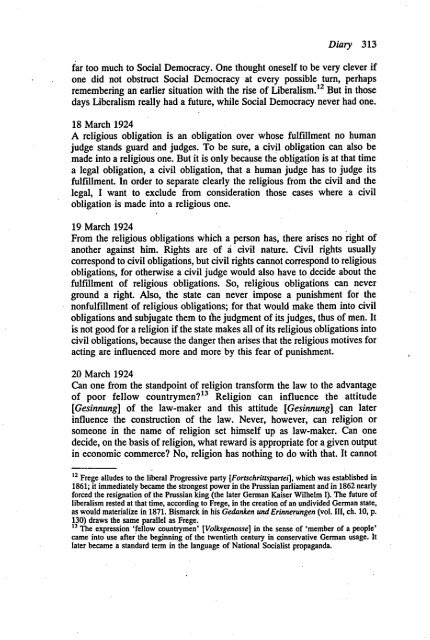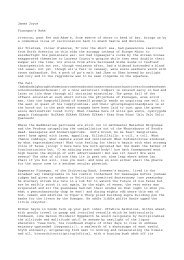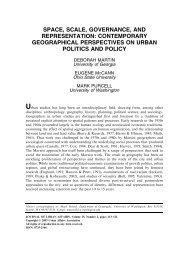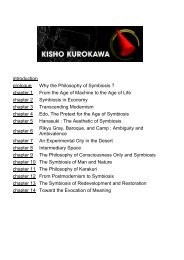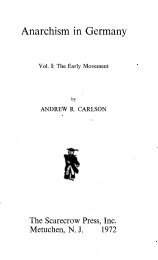Diary: Written by professor Dr Gottlob Frege in the ... - AAAARG.ORG
Diary: Written by professor Dr Gottlob Frege in the ... - AAAARG.ORG
Diary: Written by professor Dr Gottlob Frege in the ... - AAAARG.ORG
Create successful ePaper yourself
Turn your PDF publications into a flip-book with our unique Google optimized e-Paper software.
<strong>Diary</strong> 313<br />
far too much to Social Democracy. One thought oneself to be very clever if<br />
one did not obstruct Social Democracy at every possible turn, perhaps<br />
remember<strong>in</strong>g an earlier situation with <strong>the</strong> rise of Liberalism. 12 But <strong>in</strong> those<br />
days Liberalism really had a future, while Social Democracy never had one.<br />
18 March 1924<br />
A religious obligation is an obligation over whose fulfillment no human<br />
judge stands guard and judges. To be sure, a civil obligation can also be<br />
made <strong>in</strong>to a religious one. But it is only because <strong>the</strong> obligation is at that time<br />
a legal obligation, a civil obligation, that a human judge has to judge its<br />
fulfillment. In order to separate clearly <strong>the</strong> religious from <strong>the</strong> civil and <strong>the</strong><br />
legal, I want to exclude from consideration those cases where a civil<br />
obligation is made <strong>in</strong>to a religious one.<br />
19 March 1924<br />
From <strong>the</strong> religious obligations which a person has, <strong>the</strong>re arises no right of<br />
ano<strong>the</strong>r aga<strong>in</strong>st him. Rights are of a civil nature. Civil rights usually<br />
correspond to civil obligations, but civil rights cannot correspond to religious<br />
obligations, for o<strong>the</strong>rwise a civil judge would also have to decide about <strong>the</strong><br />
fulfillment of religious obligations. So, religious obligations can never<br />
ground a right. Also, <strong>the</strong> state can never impose a punishment for <strong>the</strong><br />
nonfulfillment of religious obligations; for that would make <strong>the</strong>m <strong>in</strong>to civil<br />
obligations and subjugate <strong>the</strong>m to <strong>the</strong> judgment of its judges, thus of men. It<br />
is not good for a religion if <strong>the</strong> state makes all of its religious obligations <strong>in</strong>to<br />
civil obligations, because <strong>the</strong> danger <strong>the</strong>n arises that <strong>the</strong> religious motives for<br />
act<strong>in</strong>g are <strong>in</strong>fluenced more and more <strong>by</strong> this fear of punishment.<br />
20 March 1924<br />
Can one from <strong>the</strong> standpo<strong>in</strong>t of religion transform <strong>the</strong> law to <strong>the</strong> advantage<br />
of poor fellow countrymen? 13 Religion can <strong>in</strong>fluence <strong>the</strong> attitude<br />
[Ges<strong>in</strong>nung] of <strong>the</strong> law-maker and this attitude [Ges<strong>in</strong>nung] can later<br />
<strong>in</strong>fluence <strong>the</strong> construction of <strong>the</strong> law. Never, however, can religion or<br />
someone <strong>in</strong> <strong>the</strong> name of religion set himself up as law-maker. Can one<br />
decide, on <strong>the</strong> basis of religion, what reward is appropriate for a given output<br />
<strong>in</strong> economic commerce? No, religion has noth<strong>in</strong>g to do with that. It cannot<br />
12 <strong>Frege</strong> alludes to <strong>the</strong> liberal Progressive party [Fortschrittspartei], which was established <strong>in</strong><br />
1861; it immediately became <strong>the</strong> strongest power <strong>in</strong> <strong>the</strong> Prussian parliament and <strong>in</strong> 1862 nearly<br />
forced <strong>the</strong> resignation of <strong>the</strong> Prussian k<strong>in</strong>g (<strong>the</strong> later German Kaiser Wilhelm I). The future of<br />
liberalism rested at that time, accord<strong>in</strong>g to <strong>Frege</strong>, <strong>in</strong> <strong>the</strong> creation of an undivided German state,<br />
as would materialize <strong>in</strong> 1871. Bismarck <strong>in</strong> his Gedanken und Er<strong>in</strong>nerungen (vol. III, ch. 10, p.<br />
130) draws <strong>the</strong> same parallel as <strong>Frege</strong>.<br />
13 The expression 'fellow countrymen' [Volksgenosse] <strong>in</strong> <strong>the</strong> sense of 'member of a people'<br />
came <strong>in</strong>to use after <strong>the</strong> beg<strong>in</strong>n<strong>in</strong>g of <strong>the</strong> twentieth century <strong>in</strong> conservative German usage. It<br />
later became a standard term <strong>in</strong> <strong>the</strong> language of National Socialist propaganda.


